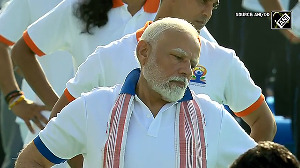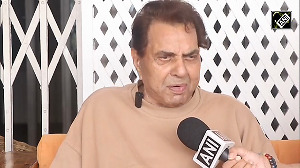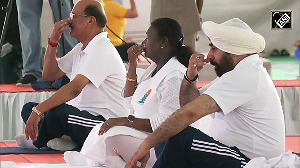The Indian journey to secure a foothold where it has virtually none, IT hardware products, has reached a significant early milestone with the rapid commercial acceptance of offerings from MobiApps.
"It is also a vindication of the Indo-global business model," says Sanjay Chakrabarty (33), CEO, coining an expression.
MobiApps is headquartered in the US but does most of its product development work out of Bangalore (except for some chipset design work done in the US) where 110 of its 160 staff are located.
The contract manufacturing is done in Austria and the sales team is distributed all over the world, with a substantial sales presence in Singapore.
Over 5,000 fleet management devices developed by it are now installed in vehicles round the world. These integrate GIS (geographic information system), GPS (global positioning system) and GSM (the mobile phone standard) technologies to track fleets round the clock, anywhere in the world, for clients.
Among the company's leading customers are GM, Hyundai, Ford, Dell India and TCIL (Transport Corporation of India Ltd).
The most recent customer win is the Bangalore Metropolitan Transport Corporation, the state owned bus company, which serves Bangalore.
Its 1,400 buses will now be tracked by the MobiApps technology (hardware and software) which will allow the fleet managers to know exactly where a bus is at a point in time and also be provided with extensive MIS on how much every bus has logged, what route it has followed, how much time it has taken for this and a lot more.
MobiApps will launch in the second half of the current year a next generation satellite modem which will change the entire technology and economics of satellite-based communication (it has filed five patent applications).
The device currently used is the size of a brick; whereas the basic system that MobiApps has developed is built around a chip the size of a calling card.
Being so much smaller, the device will be easy to install, will cost a lot less and most critically, will consume a lot less power.
Explaining the technological and business achievements of the company, Chakrabarty says, "We have done in satellite communication what has been done in wireless communication. Our success in the marketplace is getting some of our products accepted and leading in some geographies."
"We have invested over three years in Bangalore in developing a chip of our own to power a product," says Chakrabarty indicating the long hard slog that the product business involves.
With the first line of products in place with customers, "we have graduated from being a science experiment and are just beginning the second innings," he adds.
This is beginning to show on the financials of the company. In the current calendar year it is likely to reach a global turnover of $15 million, with the India business accounting for $5 million.
Cash break-even is likely to take place in the second half of the current year. As for the future, "we have the ability to become a hundred million dollar company in three years."
Chakrabarty, who is a founder, promoter and shareholder, refuses to divulge how much total funding the company has received so far, but says it exceeds $50 million in the last three years.
The company was first promoted by Arthur D Little, which still retains a stake and received its last round of $8 million funding last October from 3i and Singapore Technologies.
He is very proud of the fact that through the slog years of development, the "company has never missed a payroll and the main challenge now before us is to manage growth. We will stay focused in our present vertical but look at the next technology domain - integrating and implementing a system on chip."
Looking forward, he sees a lot more engagement with large global companies ("Fortune 100") who are discussing with it the deployment of its technology and a lot of growth in the Asia-Pacific region.





